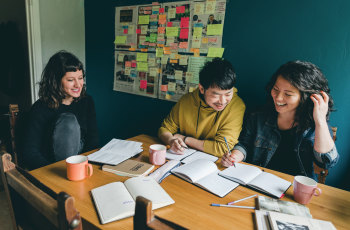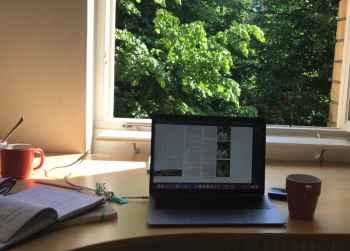October 26, 2020
Online courses: a guide to survive
Ciao a tutti e tutte!
Just a few days ago we returned to the online mode at the university: no more seminars or lectures in attendance, but just one zoom meeting after another…. how are you doing?
I’m trying to find the positive in what is happening.
Here a guide to overcome this difficult transition phase (if it is the first time for you) or accept the fact that we will have to have lectures online for a while. Don’t panic!
first rule: get organised.
 If you are a maniac and you like to plan everything in advance, this first rule won’t scare you. I understood that organisation, when most of my life takes place online, is needed more than normal.
If you are a maniac and you like to plan everything in advance, this first rule won’t scare you. I understood that organisation, when most of my life takes place online, is needed more than normal.
I have a very strictly schedule, and I try to respect it. Even when I don’t have seminars or lectures online, I’m trying to keep myself busy…this is a good way to cope with anxiety. I write everything down, and I consult my “to-do” list everyday.
I also have a special wall, in my place, where I stick different post-it with different kind of tasks, depending on what I have to do. It’s a good way to balance university, private life and, in my case, also work.
Another good way to be organised is to plan small, possible and realistic everyday goals: this is my way of surviving right now. I try to wake up at the same time every day, attend online seminars or lectures in my programme, read the suggested literature, complete the individual assignment in time…
second rule: take care of yourself.
Sounds obvious, but it’s not. I’m trying to give myself the care I need, everyday. In the famous “to-do” list, I include always a small thing I should do for myself, that I know will make me feel better. The harder task is to understand what makes us feel better. For me (again, I have been very “structured” most of my life), cleaning my apartment, organising my books or sending that letter to that friend, are always a good way to cope with my day.
third rule: try to find something good in this new way of living.
 I realised that be online not always means something bad. I have been able to follow a lot of seminars I was interested in, without having to move, take a flight, pay a ticket or a fee to participate to a conference. I also have a very good habit now: while I’m cooking, I usually look on YouTube some videos of scholars, teachers or authors I really like.
I realised that be online not always means something bad. I have been able to follow a lot of seminars I was interested in, without having to move, take a flight, pay a ticket or a fee to participate to a conference. I also have a very good habit now: while I’m cooking, I usually look on YouTube some videos of scholars, teachers or authors I really like.
fourth rule: make the space you’re living a nice place to stay.
 I realised how much counts right now to feel safe in my place. I’m lucky, I live in my own apartment, and I don’t have to share spaces with someone. But sometimes I feel alone, and I realised that I need to make the space where I’m living the nicest I can. This is why I try to keep it clean, organised, comfy and beautiful.
I realised how much counts right now to feel safe in my place. I’m lucky, I live in my own apartment, and I don’t have to share spaces with someone. But sometimes I feel alone, and I realised that I need to make the space where I’m living the nicest I can. This is why I try to keep it clean, organised, comfy and beautiful.
In addition, some of my colleagues created some stories on Instagram, collecting some useful tips to study and organise your time when we our lives are all online. Check it here!
I hope these suggestions will help you in deal with this new form of learning and living… Let me know in the comments if you have more tips!
Tanti abbracci,
Asia




Hi Asia!
Saluti da un tuo connazionale.
I see that you live alone in your apartment. I’m applying for a master’s programme and I’d like to have a place of my own too. May I ask you how much does it cost, or at least how much more than the minimum reported on the university site is it? Also did you find your current accomodation right away or did you have to accept something else first and then move?
Hoping you can answer my question,
best regards (o come diciamo noi, cordiali saluti)
MB
Hello connazionale! I’m happy to help you. When I moved in Norrköping I lived for 6 months in a student accommodation (which I found before to move to Sweden, through one of the companies suggested by the university). Around November (so 4 months after I moved in Norrköping) I started to look for my own accommodation. I was very very lucky, and I found this private company which is renting apartments without following the queue system (very common in Sweden), so basically I had to do what I would do in Italy: I send an email to the landlord, I went to see the apartment and then I got accepted there. I moved in March. I’m paying exactly how much I was paying in a student dorm, with the difference that in the students dorm I had a 12mt room (with my own bathroom), and now I have my own apartment (40mt). The price is around 3800 SEK. Here you can find more information about accommodations in Sweden (it’s my old personal blog at LiU): https://blog.liu.se/asiadellarosa/2019/12/13/accomodation-and-other-tips/
Thank you very much for your answer!
And yeah, I was already using the tips on your old blog. 😉
Thanks again!